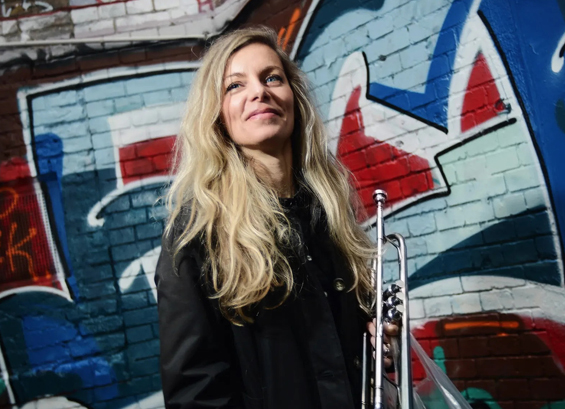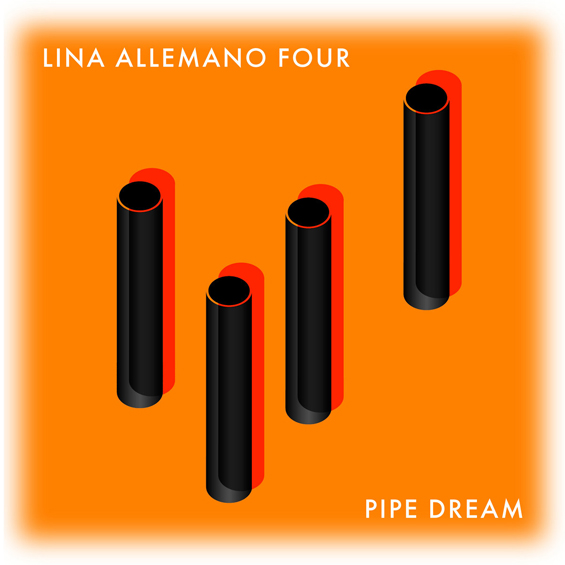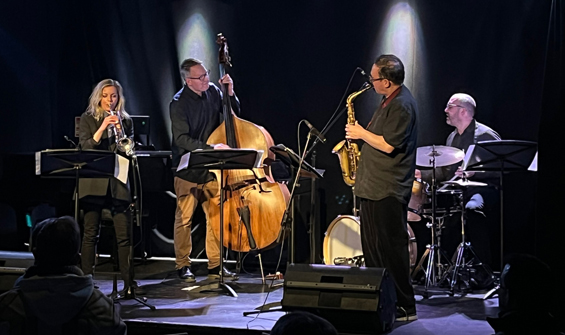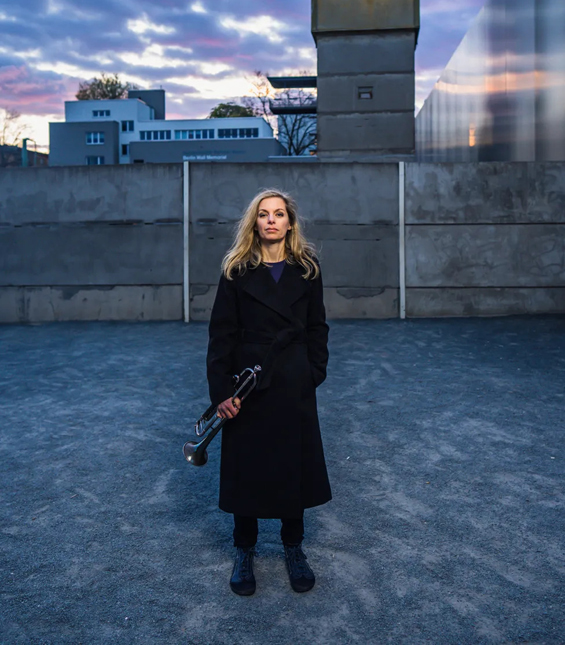

photo: Manuel Miethe
FIVE QUESTIONS WITH LINA ALLEMANO
Like everyone else, Canadian jazz trumpeter Lina Allemano struggled through the pandemic and clung to her sanity as best as possible. For someone who lives in both Toronto and Berlin, however, the imposition of non-travel might understandably have driven her to even greater despair. Not so: she got to work and used the time in isolation to write new material, some of it now presented on her acoustic quartet's seventh album, Pipe Dream (reviewed here). Partnering with alto saxophonist Brodie West, double bassist Andrew Downing, and drummer Nick Fraser, the trumpeter recorded the album at Toronto's Union Sound Company over two days in February 2021. It's a fascinating project for multiple reasons, firstly for the way the writing addresses head-on the challenges posed by COVID (most directly in the form of the four-part suite Plague Diaries) and secondly for exciting performances that embody her group's chamber-jazz approach. textura spoke recently with Allemano about the new album, the deep connection the quartet shares after being together for eighteen years, and how life in Berlin compares with life in Toronto. We thank her for taking the time to speak with us in such depth about these and other matters.
1. Given that you were born and raised in Edmonton and then moved to Toronto in 1993, how did it come about that you now split your time between Toronto and Berlin? And how do the cities compare with respect to playing opportunities and appreciation of your music? How is life in Berlin different for you from life in Toronto?
I have such a deep love for my music community in Toronto, one that's developed over thirty years through various interlocking musical relationships that have evolved in a relatively geographically isolated scene. It's deep and meaningful for me, and I'll never be able to let go of it. It's far too precious, and although it's a really special and unique little scene, there just isn't the same infrastructure, appreciation, or culture surrounding the music that there is in Berlin. I knew that I had to spread my wings at some point as the ceiling is unfortunately pretty low in Toronto as far as audience and opportunities to play. It's also much more isolated than Berlin, which is a major hub for contemporary arts with a constant influx of artists from all over the world. The city prides itself on its various cutting-edge arts scenes, unlike Toronto, which seems to be almost unaware that it even has any.
I started going to Berlin originally to study with the great experimental trumpeter Axel Dörner, whom I had heard play when he was touring through Toronto. After spending a few weeks in Berlin, I was already hooked. The scene for creative music and all kinds of creative arts practices is so much bigger and vibrant than in Toronto. I was constantly inspired by the seemingly endless amounts of cutting-edge art that was happening in Berlin, in music, dance, theatre, film, performance art, multi-disciplinary, etc. Life is essentially the same though… you still have to live your life, wherever you are. I carry on in the same manner in both places, just focusing on my work. I guess I would say I'm equally inspired by my Toronto music community as I am by the scene in Berlin, but I can't seem to live without either one so I continue to maintain a foot in both.

2. I love the way the material on Pipe Dream blurs the boundaries between jazz and classical. Text accompanying the release describes the first three pieces, “Banana Canon,” “Pipe Dream (on Prokofiev Theme),” and “Dragon Fruit,” as “long-form, slowly unfolding works that feature Allemano's new ‘orchestral' compositional aesthetic.” Could you elaborate on what that particular aesthetic entails? And what are the biggest challenges at making the kind of crossover you're presenting on Pipe Dream work?
I'm lucky to have band members who are not only musically sensitive, creative, unique, and distinctive, but also virtuosic on their instruments. Colours, textures, extended techniques, challenging material… everything is available to me as a composer with these guys. I've been recently inspired by a lot of orchestral music, and that seems to have found its way into my musical imagination of late, infusing itself in my brain and merging with all the other music I love. I'm not sure it was a conscious decision, but putting a frame around it like ‘orchestral aesthetic' has helped me describe or identify aspects of the band's current direction.
3. The connection between the group members in Lina Allemano Four is as tight as one might expect from a unit that's been together for eighteen years. How have you managed to keep the band together for so long? And what process do you use to develop a piece you've written after it's introduced to the others? Could you state one special thing that each band member brings to your group?
I'm extremely lucky with the quartet's longevity, for sure. When we started out in 2005, I knew right away it was an important project, and I've done everything in my power to keep it going over the years. The four of us have a deep respect and love for each other as artists and as people, and I think we also recognize that the music we create together at this point really has a life of its own, a life that needs to be respected and nurtured in the same way. It's not easy to find a group of musicians who are equally devoted and dedicated to a common goal for so many years. Even though I provide the main artistic direction and leadership with my compositions, the music we make is a kind of collectively realized art that requires each member's full emotional energy and artistic input. The way we play together has been in constant development over eighteen years, so it's a bit hard to separate things out and pinpoint specifically who does what anymore.

photo: Mark Reid
4. Pipe Dream is the seventh Lina Allemano Four release. Has the band's sound changed over the years and if so in what ways? And has your own approach to the trumpet changed over time?
Definitely. The band's sound has evolved gradually over the years and I think each album in sequence shows some aspect of that evolution. Often people say that our first albums were more “straight-ahead” and that we have become increasingly more “adventurous,” “free,” or “experimental” over time. I'm not sure I would characterize our evolution in such simple terms because to me it feels a lot more complex and nuanced. I'm not comfortable calling our music “free jazz” anymore, which is why I came up with the term “chamber jazz”, though this also doesn't satisfy me completely. Improvisation features heavily in our music, but the way we improvise together is not what I would call “free jazz” or even “improvised music” because we refer so heavily to the composed material in our improvisations, which become an important part of the compositions… the improvisational and compositional elements are intertwined and cannot be separated. I'm not sure if that answers your question exactly, but yes, my trumpet playing has also evolved over the years. I did make a conscious decision at some point to work on developing new extended techniques on the trumpet that would allow me to more easily convey the ideas, sounds, and concepts I was hearing in my head.
5. As I listen to Pipe Dream, it dawns on me that each member could be adopting the role of an orchestral section, you representing the horns, alto saxophonist Brodie West woodwinds, double bassist Andrew Downing strings, and drummer Nick Fraser percussion. Were you thinking at all along those lines as you were writing the material and thinking about arrangements?
Absolutely. I was definitely thinking orchestrally. A fellow musician recently described the band as sounding like a mini-orchestra at times. I can't describe exactly what goes on in my head when I'm composing, but I definitely hear the band when I'm working on a new piece and each of our voices in my mind's ear. Sometimes I'm a bit unsure if what I'm imagining might end up being too physically awkward on various instruments, for example, so I always check in with them when I have specific concerns and we work things out in rehearsal and I revise as necessary. I'm not sure that I ever brought in a piece that didn't get revised at least once after rehearsing it. Often pieces get revised multiple times before I'm satisfied. Hearing how the parts sit in real life and getting artistic input from the band members is an important part of my process as a bandleader and composer. For me, this way the music that is created reaches an even deeper artistic level… it is much more refined and more alive.

photo: Jamie Croft
Bonus question: The dominant work on Pipe Dream is the four-part suite Plague Diaries, which you wrote in Toronto during the first months of the pandemic and which captures the bleakness of that time and the isolation and dire fiscal repercussions that came with it. How did you get through that period and how does the future, personally and professionally, look to you now?
I wrote a lot of music during the lockdowns, which I mostly endured alone in my basement apartment in Toronto when I wasn't out walking or taking long bike rides. I wrote the music for Plague Diaries, which is my largest work yet, as well as a whole series of experimental canons that I wrote for trumpet and different chamber ensembles. The chamber ensemble project will be released in the fall of 2023. The pandemic was an extremely challenging time for me, but despite that, I was still able to produce a lot of work and stay on schedule with two new releases that came out on my label in 2021: Lina Allemano Four's Vegetables and BLOOP's Proof. I'm feeling good about all the work I'm getting to do these days and grateful for all the music I get to make with my various projects; there's really nothing else I'd rather be doing.website: LINA ALLEMANO
April 2023![]()